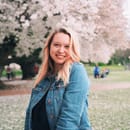The opinions expressed in this article are the author’s own and do not reflect the views of Her Campus.
By Maya Pete
No one has ever asked me what “Black Girl Beauty” means to me before. I’m actually thankful for that, because there are so many other aspects of my identity that I have to explain or perform when I’m in the greater community. It’s beautiful not to have to constantly verbalize this raw, feminine energy that radiates out from the inner depths of my black soul, unless I should choose to, because there is power in doing that as well.
But before I can explain what Black Girl Beauty means to me, I have to recount the ways in which I came into my own embodiment of it. While growing up in West Texas, I never ventured to see myself as beautiful because LatinX and White beauty standards dominated my social sphere. And here’s the thing: not only was I black, I was also a big girl. I remember one of the guys in my middle school class telling me he was going to call me “Big Black” like the guy from the MTV show, and I laughed it off because everyone else was laughing. But I was only 12 years old, and to be honest, it crushed me. After that I remember consciously avoiding mirrors and reflective surfaces whenever I could, because not only did I think I wasn’t beautiful, I actively thought that I was ugly.
I carried this discomfort with my skin and my body type with me to Stanford, but it has been within this university, or rather within the hub of black excellence at the heart of it, that I have developed a sense of confidence in and adoration for my skin. I came to this realization upon being surrounded by people that looked like me, but in so many different and beautiful ways. To quote an influential member of our Stanford Black Community, I saw that black girl magic is “Black, African, Caribbean, Jamaican, Muslim, Christian, Multiracial, Queer, Transgender,” and so, so much more. I felt included in a way that I had never been invited to feel before. This was a movement, an all-encompassing manifestation and celebration of my existence.
It’s funny the power that words and labels can have on the way that we conduct ourselves in society. For instance, the “Big Black” taunt has stuck with me for nearly a decade, but I’m sure when that little boy let those words come out of his mouth he had no idea how they would affect my perception of myself for years to come. The words, “Black Girl Beauty” have just as powerful, but opposite, effect. They empower a group of women to let the inner beauty that brews beneath their tough, pigmented skin to shine outward and mesmerize those who are lucky enough to witness.
I find that the issues I had with understanding my beauty (inner and outer) came from my inability to witness a similar kind of beauty in a community outside of the immediacy of my family. I walked nearly alone in my black girl-ness for years, and in doing so stifled an element of self-acceptance that is crucial to self-love. But the hashtag #BlackGirlBeauty allows girls and women, whether they’re in situations similar to or completely different from mine, to find and be a part of a community that lets them know that everything about them—from their hair to their body type to their intellectual aspirations—is something that can, and should, be celebrated.
To me, Black Girl Beauty is a celebration of the black woman’s spirit that refuses to be broken down by the systematic oppression, hypersexualization and injustices that we face. It is a movement that does not seek to alienate any body of people, but rather to lift up those with similar experiences and allow them to challenge the standard. Simply put, the magic in Black Girl Beauty, to me, means resilience, beauty, power and love.


